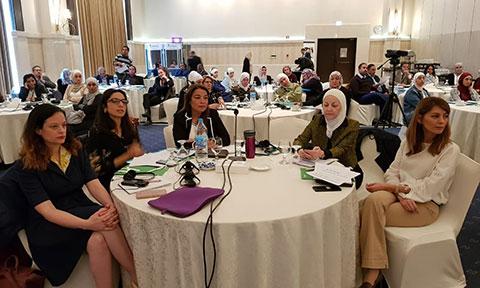

A meeting to discuss the preliminary results of the qualitative study named “Motivations behind Child Marriage in Jordan” was held on Thursday by HPC in collaboration with UNICEF and with the participation of the relevant national actors.
The study, prepared by UNICEF Jordan office and HPC in collaboration with the University of Edinburgh and with the participation of the relevant actors in Jordan, aimed to answer the main question of “what are the behavioral and social motives that lead to child marriage in Jordan, how do social beliefs and expectations affect child marriage among the different demographics and under which circumstances and what can be done to address such causes?”.
The study’s methodology involved an in-depth review of the previous academic studies conducted on the risk and protective factors of child marriage in Jordan, and a secondary analysis of the data sets of the demographic and health studies. Furthermore, a qualitative study was conducted on 526 individuals from various groups that included the parents, extended family members, young people, refugees, policy makers, experts and community leaders from 7 different governorates (Mafraq, Zarqa, Irbid, Amman, Karak, Ma’an, Jerash).
HPC secretary, Dr. Abla Amawi, reaffirmed that child marriage is a problem that has visibly re-emerged in the past five years. The Population and Housing Census of 2015 showed that married females under the age of 18 comprised 18.1% of all marriages in Jordan. Jordanian females comprised 11.6%, while Syrian females comprised 43.7%. Amawi added that this problem is one of the primary population issues that threaten the society’s demographic characteristics and that evidence show the negative impact of child marriage on a wide range of development outcomes, not to mention the economic and human costs of the marriage of girls under 18.
Amawi pointed out that HPC prepared a specialized study for purposes of identifying the scale of the problem and its temporal and geographical trends and learning the implications, causes and the motives behind it, and a brief of proposed policies was produced. She further stated that the study’s recommendations and policy brief were adopted by the Prime Ministry and the relevant institutions were instructed to implement its recommendations. These recommendations were translated to the adoption of a national action plan to reduce the number of marriages of those under 18 for the years 2018-2022. The action plan was also adopted and disseminated.
Amawi explained that it is critical to unify efforts in order to implement the national action plan to reduce the number of marriages of those under 18 for the years 2018-2022. This came in light of the House of Representatives’ recent adoption of the legal age of marriage for minors to be 16 in exceptional cases. According to Dr. Amawi, efforts must be particularly aimed at preparing a study on the impact of amending the instructions regulating exceptions in relation to the marriage of those under 18 in the Jordanian Personal Status Law; working with Shariah judges on addressing such issue in their work and integrating the instructions related to such in the annual training needs of the Shariah Judiciary Institute; carrying out a lobbying campaign for the amendment of the exception instructions with council members in governorates and Shariah judges; in addition to preparing a study on the impact of raising compulsory education to high school; reviewing the governing regulation and instructions to reduce school dropout and amending them in accordance with the public policies for reducing the number of marriages of those under 18; developing a guide for dealing with school dropouts and arranging media interventions to raise awareness around child marriage.
On the other hand, UNICEF’s Deputy Representative in Jordan, Ms. Ettie Higgins, commended the Government of Jordan for its efforts to empower girls in completing their education and the constant support it provides to reduce child marriages and mitigate the damage caused by them. Ms. Higgins stated that UNICEF believes in the importance of mobilizing collective efforts to prevent child marriage and working with partners to develop a number of measures to support such goal.
Furthermore, she stated that every case of child marriage that can be prevented is a change given to that child and to future generations to meet their potentials, adding that change happens when everyone works together to turn hope to a reality.
The study came up with a number of findings, most notably that the main motives behind child marriage in Jordan are customs and traditions, poverty, family disintegration, lack of awareness and virtue protection. Customs and traditions were considered the primary motive behind this type of marriage which involved several reasons such as inherited behaviors and beliefs, the culture of shame and intermarriage.
Findings showed that there has been a high prevalence of child marriage following a decade of decline in prevalence. The Demographic and Health Survey, prepared by the Department of Statistics, indicated a gradual decline in the marriage of those under 18 and a smaller gap between 2007 and 2012 in the marriage pattern between those under 15, with a slight increase in the number of marriages of those under 15 and those under 18, according to the latest data from 2017/2018. Furthermore, findings showed that education remains one of the factors that have an active role in preventing child marriage, especially for girls.
During the meeting, the priorities for action in the issue of child marriage were set in light of this study’s findings and a discussion was held about the main interventions that address the motives behind child marriage in Jordan and the extent to which such priorities are in line with the national action plan to reduce the number of marriages of those under 18 for the years (2018-2022).







